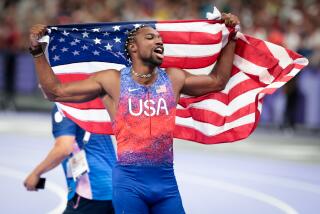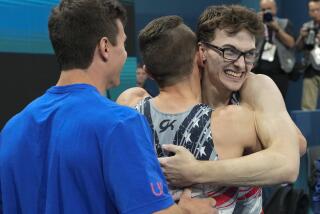Hartwig can finally set his sights high
- Share via
EUGENE, Ore. -- Sixteen years ago, when Jeff Hartwig did this for the first time, he was a wide-eyed young man happy merely to be in the U.S. Olympic track and field trials.
Now, in his fifth appearance at this meet, the pole vaulter from St. Louis felt remarkably similar sensations as the 2008 trials began Friday night.
“Four years ago, I could never have imagined I would be competing here,” Hartwig said. “So it is a little reminiscent of the way it was back in 1992, but I felt a lot more anxiety back then.”
Who would figure on still being an active vaulter at 40, as Hartwig is?
And who would figure that, at 40, he already has done better than he had in the last two Olympic trials, which he entered as the U.S. record-holder but failed to clear a height in the qualifying round either time.
“It was a big relief to clear a height on my opening jump,” Hartwig said.
That one jump, at 18 feet, one-half inch, was all Hartwig needed to move into Sunday’s final.
Hartwig said he tried not to let his 2000 and 2004 flops be a negative in Friday’s qualifying.
“I looked at it as those were just two more experiences to draw on,” Hartwig said.
Hartwig has competed in only one Olympics, finishing 11th in 1996.
“I don’t think it is as remarkable that I am doing this at 40 as it is that I am competing in my fifth Olympic trials,” he said.
“I’m in a unique situation because I have been able to compete full time all those years because I wasn’t injured.”
Until this year, Hartwig had the three highest jumps in U.S. history, topped by a mark of 19-9 1/4 from 2000.
In early June, current world champion Brad Walker broke that record with a vault of 19-9 3/4 .
Walker also made the final Friday.
USA Track and Field’s new qualifying system created races within the race in the opening day’s only final, the women’s 10,000.
The four women who already had met the Olympic ‘A’ standard qualifying time, 31 minutes 45 seconds, had an advantage over everyone else.
A runner without the standard who finished in the top three would not make the team -- unless she did it in the trials.
There was a stirring race for first, in which U.S. record-holder Shalane Flanagan (31:34.81) out-kicked world bronze medalist Kara Goucher (31:37.72), both of whom already had the ‘A’ standard.
And there was an equally stirring run for third by Amy Begley of Kendallville, Ind., who had not previously run fast enough until Friday.
Begley, who trains with Goucher, refused to quit when she fell away from the leaders with about four laps to go.
She poured every ounce of energy into the last two laps, covering them in 2:18.6 to finish in 31:43.6, or 16 seconds faster than her previous best.
At the other end of the time spectrum, Marshevet Hooker also was having the times of her life.
For much of this season, Hooker and double world champion Tyson Gay have worked on starts together in Arlington, Texas, with coach Jon Drummond clocking their times after 10 yards. Hooker occasionally beat Gay and the three other elite sprinters training with them to the 10-yard mark.
“It has helped me a lot being in the group,” Hooker said. “We push each other every day.”
That was clear when Hooker matched her personal best time of 10.94 seconds -- albeit with a tail wind just strong enough to make it wind-aided -- in a first-round heat of the 100 meters.
She rode a considerably stronger tail wind to win the quarterfinals in 10.76, a time bettered by only four women in history under any conditions. Lauryn Williams, the 2004 Olympic silver medalist, was second in 10.86.
Leading contenders Allyson Felix, Torri Edwards and Alexandria Anderson were among those who advanced to today’s semifinals.
Philip Hersh covers Olympic sports for The Times and the Chicago Tribune.
--
(BEGIN TEXT OF INFOBOX)
The runaround
A look at today’s main events at the U.S. Olympic track and field trials:
Women’s heptathlon, final three events -- The long jump, javelin and 800 remain. Hyleas Fountain of Dayton, Ohio, is the leader after the first four events with 3,989 points. That’s a personal best for her at this stage.
Women’s 100-meter dash semifinal and finals -- Marshevet Hooker put herself into contention with a wind-aided 10.76 in Friday’s second round, after a 10.94 preliminary time. But did she tire herself out?
Men’s and women’s 400-meter hurdles semifinals -- Jeshua Anderson of Washington State had the top men’s quarterfinal time, 49.05. Tiffany Ross-Williams of Orlando, Fla., who missed the 2004 season to have a baby, had the top women’s quarterfinal time, 55.47.
Men’s and women’s 800-meter semifinals -- Lopez Lomong, a Sudan native who lived in a refugee camp for 10 years, had the top quarterfinal time, 1:46.93. Alice Schmidt, a two-time NCAA champion, and Hazel Clark, a two-time Olympian, had the fastest women’s times, 2:03.58 and 2:03.65, respectively.
Men’s 100 qualifying and quarterfinal -- Tyson Gay starts his quest for the 100-200 spring double.
Men’s shot put final -- Adam Nelson, Reese Hoffa and Christian Cantwell qualified 1-2-3, as expected. They’re all showmen and should put on a good display.
-- Helene Elliott
More to Read
Go beyond the scoreboard
Get the latest on L.A.'s teams in the daily Sports Report newsletter.
You may occasionally receive promotional content from the Los Angeles Times.






